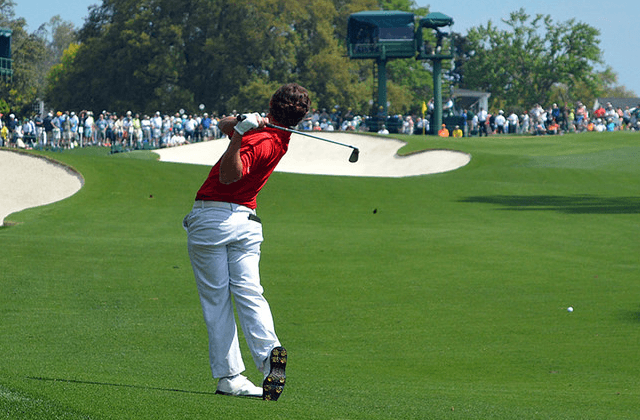
How to control your nerves under pressure
When the pressure’s on, you need to have the best tools at your disposal to stay mentally tough to persevere and produce your best.
Firstly, it’s important to know your optimal level of intensity. When you produce your best results, are you pumped up, or more relaxed? To find this out, you need a consistently good post-round evaluation. Nerves are a good thing. Ask any Tour player whether they would want to play with nerves, or not, and it would always be with. You’re more focused and determined. Controlling nerves in golf is going to give you the best chance of performing your best. See the graph below:

If you’re too relaxed, you’re on the left side of the optimal level, and too nervous, you go the other side of curve.
In this post, we’re going to focus on what to do when you’re too nervous or “too intense”.
What happens when we’re too nervous?
You’ve probably heard of “the fight or flight response”, a term used to describe what happens (mentally and physiologically) when we feel fear.
It’s called the fight or flight response because standing and fighting, or running away is the only choice you are given by your brain – rational thinking and reasoning isn’t an option. You’re unable to think clearly. Why? This is a survival instinct that nature developed hundreds of thousands of years ago when there was real danger to the lives of our early human ancestors, such as being eaten by a large predator.
What does this have to do with your golf game?
Obviously there’s no threat of any real danger on the golf course. But what we perceive as danger is not physical, but a feeling. It’s the fear of what it feels like to fail, be disappointed or being looked down upon by others.
Unfortunately for us, we have the same primitive response to any kind of fear. In the millions of years of human existence, there’s been no software upgrade when it comes to our response to fear. Your heart starts racing to get blood to your muscles in preparation for either fighting or flighting and your brain starts shutting down (the stress response). Your muscles tense in preparation, which is not conducive to a fluid golf swing.
Controlling nerves in golf
In order to regain control of our minds and bodies during those times of fear on the course, we need to get control of our physiology i.e. our heart rate. If you can control your heart rate, you prevent the from brain shutting down and your muscles tensing up.
The most effective way to do this is with good breathing techniques.
Breathing techniques for playing more relaxed golf
To play more relaxed golf, your breathing needs to be rhythmical and steady. The ratio of time taken to inhale vs exhale isn’t as important as the rhythm. So if it takes 3 seconds to inhale (through your nose until your belly goes out), then a hold for 2 seconds, and a exhale (through your mouth) for 6 seconds, then that same pattern needs to be repeated until you feel your heart rate lower and you become less stressed. Try this before your round and in between shots. Repetition of this will enable you to stay calmer, think more clearly and maintain your optimal level of intensity.
Photo by Ryan Schrieber

